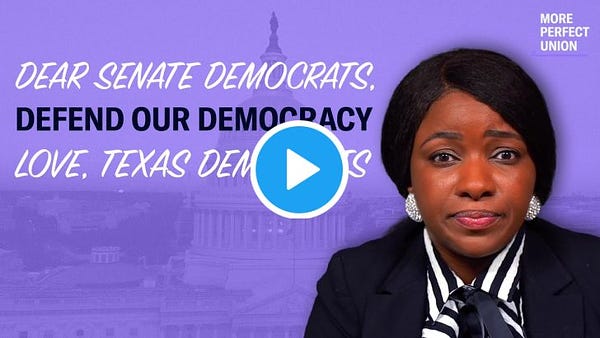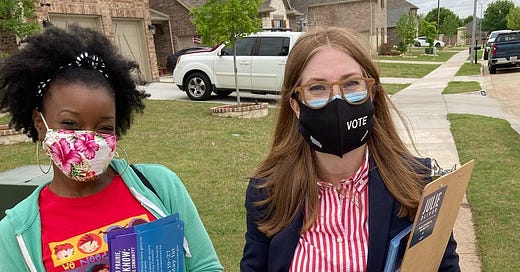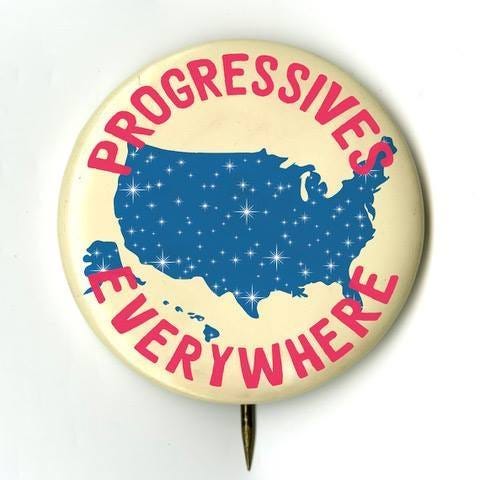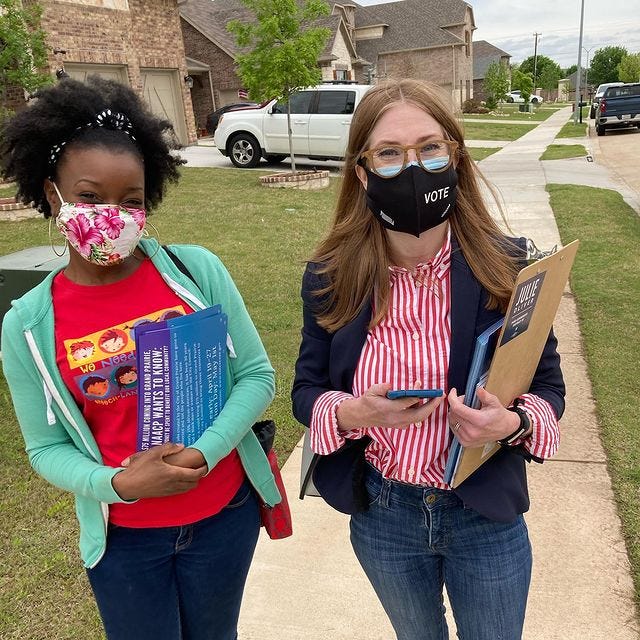Welcome to the big Sunday edition of Progressives Everywhere!
The future of democracy may well rest on whether Joe Manchin’s colleagues can convince him of unimpeachable truths like the grass is green, water is wet, and Republicans don’t want to work with Democrats on voting rights. (Kyrsten Sinema just doesn’t seem to care at the moment.)
After some research and conversations over the past week, I’m increasingly convinced that the best chance of moving the West Virginia senator towards supporting the For The People Act (or at least some version of it) is by appealing to his sense of history and concern for his own legacy. And with that in mind, here’s a new video that I produced at my day job at the progressive media organization More Perfect Union:


Today’s edition of the newsletter is actually very Texas-centric, though news from a number of other states is also contained herein.
And with that, let’s get going!
But first, thank you to our latest crowdfunding donors: Greg, Thomas, and Aileen!
Progressives Take Initiative in Texas
The day after she fell short in her second straight congressional race, Julie Oliver, who had radiated enthusiasm in the run-up to Election Day, was feeling distraught.
“I was like, ‘OK, I can't deal with Texas anymore,’” she recalls. “I thought, ‘We are a lost cause. I'm ready to throw in the towel. I've lived here my whole life, but I'm ready to throw in the towel.’”
After coming surprisingly close to unseating Rep. Roger Williams in 2018, Oliver took another crack at Texas’s very gerrymandered 25th Congressional District in 2020. This time, she received a fair amount of support, as the DCCC put her on its Red-to-Blue race list while Bernie Sanders and Elizabeth Warren both endorsed her campaign. She did everything that the party’s campaign consultants suggested... then lost by a few more points than she had in 2018.
Oliver has some theories as to why that happened (keep reading!) and her disappointment was not unique. After Democrats made significant gains in the state in 2018, many experts thought that 2020 would be the year that Texas finally turned blue. It didn’t quite work out that way — Joe Biden came closer to winning the state than any Democrat since 1976, but the rest of the ticket was overwhelmed by Republican turnout. Democrats gained no further seats and largely fell flat in legislative races. The party even lost significant ground to Republicans in deep blue districts along the Mexican border as Biden lost a number of counties that had gone overwhelmingly to Clinton in 2016.
But giving up isn’t in Oliver’s nature — just read her biography. And true to form, Oliver’s exhaustion and frustration wouldn’t last long, as the contagious energy she’d put into her two campaigns soon came back her way.
“One of my old campaign workers and my daughters said ‘Come on, let's go to Georgia, let’s knock on doors [for the Senate runoffs],’ so the three of us took a road trip to Georgia,” Oliver explains. “It reignited my love of block-walking. After not being able to do it because of the pandemic, we did it in a safe way in Georgia, with masks and stepping back from the door, and people were ready to talk. I came back very inspired by that.”
The Democrats’ sweep in Georgia on January 5th reaffirmed her belief in the importance of face-to-face conversations and on-the-ground activism. For months, Oliver spoke with friends and allies in the progressive space, trying to figure out where the party had gone awry and how they could fix it.
Last week, Oliver and fellow Democratic candidate Mike Siegel announced the launch of Ground Game Texas, a new progressive organizing group that aims to engage communities year-round through a variety of actions and campaigns. They already boast an impressive list of high-profile endorsements, though it’s people power that they’re pursuing.
I spoke with Oliver on Friday about the lessons she took away from the very unconventional 2020 election, her plans with Ground Game Texas, and what she thinks the Democratic Party needs to do to win in traditionally red places.
Last year was a unique election due to the restrictions created by Covid, but were there any lessons you took away from it that you think are applicable going forward?
After Georgia, I realized that we have to have that same level of intensity and engagement with voters, especially the folks who are left out of the electoral process, year-round. We know that the Democratic Party relies heavily on the African-American and Latino vote and yet there's not a continuous year-round engagement with those demographics. There is this expectation that African-Americans and Latinos will show up and vote on Election Day, and many of them do, but many of them have said to me that “my life doesn't change when I vote, so I don’t vote anymore.”
Mike Siegel and I had the opportunity to join the board of Register2Vote, a nonprofit here in Texas that has nationwide reach. Texas is one of the most onerous states when it comes to voter registration, because if you try to help somebody get registered and you aren’t a deputy voter registrar, it’s a state jail felony. Register2Vote is a way to circumvent these Jim Crow-era laws and get folks registered at scale by mail. The founder said, “I know y'all believe in the mission of Register2Vote, so y'all can launch Ground Game Texas from it if you want.”
Mike and I've been working to create coalitions in midsize cities around Texas. As part of our postmortem analysis, we looked at data on the issues that got people out to vote. Part of it was very popular progressive policies that are on the Democratic end of the spectrum, but people didn’t know that.
In 2020, there were three issues that outperformed Biden across the board: A minimum wage increase, Medicaid expansion, and the legalization or decriminalization of marijuana.
Can you do ballot initiatives in Texas?
Texas law precludes statewide citizen-led ballot initiatives, but we can do municipal citizen-led ballot initiatives. So we've been working on coalitions in midsize cities, saying hey, let's do a citizen-led ballot initiative on marijuana decriminalization in places like Killeen, Texas, which has a very large veterans population because it sits right outside of Fort Hood, and is also a majority-minority city. There are real opportunities to pull people into the electoral process by getting them engaged in a ballot initiative.


How big is a mid-sized city? How many are you targeting?
There are about three dozen cities between the size of 100,000 and 400,000 in Texas. And there's not a lot of political or electoral activity in these cities. People might get mailers during an election cycle, but canvassing isn't broad and candidates don't visit. Houston gets a lot of attention, as do San Antonio, Austin, Dallas, and Fort Worth. But some of these smaller cities like Grand Prairie and Arlington don't get that attention and focus.
There are really wonderful organizations working in big cities, and I don't want to minimize the work that they're doing, because there's a reason why Tarrant County is turning blue and Dallas has turned blue and Harris County has turned blue. We want to follow their lead and follow the lead of what has happened in Georgia and in Arizona and work on the smaller cities.
We think that this is a real opportunity for us. Killeen only had 49% turnout for a presidential election that had almost 67% turnout. So if we actually lifted turnout to presidential levels, that means we would have more than 30,000 additional votes from one city and that would flip Congressional District 31.
So you’re going to help get these initiatives on the ballot and encourage people to vote for them?
We’re going to go door to door and collect signatures from registered voters and educate people as we're going door to door. We want to strategically align them with important elections where we need turnout, and obviously, November of 2022 is a strategic one for us.
Sometimes Republicans have strangleholds on cities because turnout is so low in the municipal races. So Mike and I just did a pilot initiative in Grand Prairie to see if it would work with very little financial resources.
We raised $5,000 and put five people on the ground to get out the vote for a municipal election. We ended up knocking on nearly 3000 doors and making an additional 2000 calls. We made 5000 connections and reminded people that there's an election right now and that they had a choice. And two African-Americans won, bumping out the incumbent white Republican city council members.
Will you be registering voters during the process?
We still have a tremendous opportunity to get folks registered to vote in Texas. The Democratic Party of Texas just had a press release saying that they were going to try to register two million voters in Texas and I think that is about the right number. So there'll be a two-pronged approach and that's step one. Step two is educating them to come out to vote if they're newly registered voters or the folks who have not participated in a long time because they feel like their life doesn't change because of a vote.
Where else are you looking to run initiatives in the next few years?
We’re reaching out and looking at demographics and we want to figure out what each city can use and where we think you can get the most juice from the squeeze. So we're looking at cities that have depressed turnout and opportunities for registration as well. Demographics that would be favorable, typically, for Democrats and progressives. The second step is starting to talk to partners and allies in those towns, the people who already live there. So when we went to Grand Prairie and our pilot project, we got the NAACP involved in our project. They were already involved [in the initiative] and we said hey, we would love to help out because we see this as an opportunity to change voter behavior and we want to come in and support it.
We were on a call today that had 10 organizations. We’re working on something here in Austin, we'll be working on something in Killeen with the NAACP, with LULAC, with some of the elected officials out there. And then there's this group called Let’s Move Killeen. It's just a group of activists who have been trying over the last couple of election cycles to increase turnout. In Houston, we're working with the Sunrise movement and with labor on a proposal down there. We’re looking at proposals in Mission, Texas, which is in South Texas.
Our Revolution actually has some robust chapters across the state — not every chapter is super robust, but they're real. Some of our volunteers are from our campaigns, too; it’s a group of people still [working] together.
A $15 minimum wage passed with over 60% of the vote in Florida, but Democrats there didn’t embrace it, and they wound up getting wiped out. There is broad support for progressive policy, but as you said, no one knows Democrats support them. Or at least some of them support some of the policies.
Democrats don't own these popular issues. In fact, a few days ago, Lake Research revealed some polling that they had done that found that people don't know what Democrats stand for. So Mike and I are making it simple — we call it “Workers, Wages, and Weed.”
The Democratic Party tried to talk to people about pre-existing conditions for health insurance. But if you're a senior citizen, you don't have to worry about pre-existing conditions because you’re covered. If you are one of the 30 million people who don't have insurance, guess what, you don't care about pre-existing conditions because you're not covered anyway. It was such ridiculous messaging in 2020. People were fed up with Trump and they voted for Biden, but down-ballot, Democrats didn't win.
Democrats really lost a lot of ground in the Rio Grande Valley and South Texas, in Hispanic-heavy border towns that usually vote heavily for the party. Some people say Trump had a unique appeal and things will return to “normal,” but Democrats just lost a mayoral race in McAllen, a city Hillary Clinton won by 40 points and Biden won by just 16. Republicans are now actively trying to shift it red. Do you have a theory on what’s going on there?
One, you had the Republican party and Trump doing a lot of advertising in Spanish language radio and Spanish language television, outspending Democrats. That's never happened in South Texas before. Another thing, I was speaking with a State House representative from Brownsville and he said, “Trump came to South Texas and that means something to us.”
The King Ranch is hundreds of thousands of acres that separate the rest of Texas from South Texas. “We feel so cut off from the rest of Texas, so when anybody comes here, it is a big deal to us. And we remember it,” he said. And so, as he told me, “John Cornyn shows up and Greg Abbott shows up, so people will vote Republican at the top of the ticket and switch right back over and vote for every other Democrat all the way down.”
Again, the Democratic Party has taken demographics within our party for granted. Biden didn't show up in South Texas. I don’t think Biden even came to Texas. That is a problem. I think about where Trump was going as the president. He was having rallies and no, they were not smart and they obviously did not honor science and the Coronavirus threat. But he was having rallies everywhere and people came out and that again is like having a celebrity come to your town.
What is the public perception of Democrats in Texas? I know you’re in Austin, which is a bit different, but statewide, what do you hear about the party?
I can even tell you in Austin, I think the Travis County GOP is planning something. You think of it as being this kind of Democrats paradise, but there are a lot of moderate Democrats who do not like progressive values. They're usually very, very wealthy Democrats. But our problem is that Republicans got an extremist on the City Council last November. They invested $2 million in a ballot initiative in May with no candidates on the ballot — the unhoused camping ban — so what Mike and I want to do for good, they did for evil.
They’ll do another one in November, and they'll spend probably $2 or $3 million again with no candidates. You don't invest $5 million in an off-year when there are no candidates unless you're planning something big the following year. So I feel like Democrats even here are sleepy and if we are not proactive, if we do not go out on the offense, we can lose what we have here in Austin.
Outside of Austin, I think that some of the messaging in October, calling Democrats socialists and saying defund the police, I do think some of that worked. Of all the rallies and the protests across the nation, they only focused on the ones that had some level of violence, even though a vast majority were peaceful. It often worked on senior citizens, because it's easy to instill fear in the older population. I had senior citizens who were Democrats saying “I'm not going to vote for you because you want to defund the police.” And I said, “no I don’t, and I'm not running for city council, so that wouldn't even be an option.” But they’d say they don’t believe me.
If you don't give somebody something to vote for and you're just constantly playing defense — Wendy Davis actually went on the defensive on the defund the police charge, she put a TV ad up that said, “I do not favor defunding the police.” It didn't work. But we didn't give them anything else. And again, we weren't able to do field campaigning to counter some of these messages.
So what does change minds? How do you convince people otherwise?
Right now, the Democratic Party doesn't really have one cohesive message that lets people know how their lives will be dramatically different if they are allowed to pass legislation in their favor. Historically, the national party doesn't build infrastructure for the field. Obama did, but the party has not adopted that.
When Mike Siegel and I were brought on as Red-to-Blue candidates, which they consider the most competitive seats in the country, it was all about fundraising. It was about making sure that consultants could get paid, your TV media consultants could get paid, your mailer consultants… It was call time, call time, call time.
Their strategy has not worked in Texas for 40 years and I wish they would realize it is real human connection that will change voter behavior. A TV ad is never going to change them. Someone who has not voted in five election cycles is not going to say “I think I'm gonna go change now because that was a really great TV ad.”
Reminder: I cover lots more news, keep up on these stories, and publish interviews throughout the week in the issues sent out to premium members!
Health Care
Nevada: Gov. Steve Sisolak put pen to paper on the state’s new public health insurance option last week, a significant victory even if it’s not exactly a public option in the way we’ve come to understand it in the national health care dialogue:
The new law requires insurers that bid to cover Medicaid recipients and state employees to also bid to offer a so-called public option plan. State officials would select certain providers to be in-network for the public option plan and mandate that they charge 5% less in monthly premiums than the average plan on the state insurance marketplace created by the Affordable Care Act and 15% less four years after it is first offered.
There are 350,000 uninsured Nevadans, making this worth trying, especially with the federal government seemingly unable to move on health care.
Drug Prices: According to new research from Duke University, the opening prices of new pharmaceutical drugs have doubled since 2005, an egregious violation of decency that has nothing to do with market incentives or innovation. Instead, the gouging has largely been the result of a shift in payment formula enacted in the Medicare Part D law passed that same year.
Democrats have been running on reducing drug prices for the last decade, a promise that often wins them seats but then divides the caucus as soon as it convenes in Washington. There are two competing approaches to lowering drug prices right now; one being developed by Speaker Nancy Pelosi would allow Medicare to negotiate directly with pharmaceutical companies and let insurance companies use those prices, while the other, being developed in the Senate, would do far less.
Alas, Democrats still get a ton of money from the pharmaceutical industry and are advised by drips who say things like this:
“We've just experienced an amazing example of incredibly effective innovation,” Nichols said, referring to COVID-19 vaccines that have pushed back a deadly pandemic in this country. “Innovation is important, and the structure of any bargaining arrangement has to balance the need for affordability with the need to incentivize innovation.”
Nichols is actually a highly respected health economist, yet somehow doesn’t mention the fact that the US underwrote much of the development of the Covid vaccines while providing every advantage it could possibly muster. The current system actually disincentivizes pharmaceutical companies, as it leads them to focus on drugs that have little impact. As of 2019, pharmaceutical companies only spend 17% of their revenues on R&D.
Voting Rights
Maine: A bill that would enact online voting registration has passed both chambers of the legislature and is on its way to the desk of Gov. Janet Mills, who will sign it very soon.
For the People Act: HR 1 began as a smorgasbord messaging bill when Democrats had no power to pass it into law, which made it easy for senators to co-sponsor it. Now that they’d actually have to take action and live within the system the bill creates, many of them are having second thoughts — especially around the sections that involve dark money, the public financing of elections, and lobbying.
Simply put, some Democratic senators don’t want to give up their big fundraising advantages or put restrictions on their opportunities to get rich after leaving office. It’s not just Joe Manchin that is reluctant to move on the bill, though he’s taking all the heat (which he loves). As a result, the caucus has discussed breaking the bill up to focus just on the sections governing voting rights and the electoral process, even if the financial aspects are by far the most popular elements.
In other news, Pelosi thinks she still has a shot of convincing Manchin to support the For the People Act… or some version of it.
Texas: Now that the public has had a chance to take a peek inside the horror show bill that Republicans tried to pass through the legislature in a last-minute sneak attack a few weeks ago, GOP legislators are starting to walk back some of the more flagrantly corrupt and likely illegal aspects of SB7.
First, it was the ban on Sunday voting before 1 pm, which Republicans claimed was a typo and not an effort to squash Black churches’ Soul to the Polls events. Now, legislators promise that they totally didn’t intend to include a clause that would make it super-easy for a judge to overturn an election on the thinnest of conjecture. Believable!
Weed Watch
Wyoming: Voters next year will get the chance to legalize medical marijuana and decriminalize the stuff altogether thanks to a 2022 ballot initiative submitted by… libertarians!
Connecticut: The Democratic-controlled legislature ran out of time to enact marijuana legalization during the session that concluded on Wednesday, so Gov. Ned Lamont is calling for a special session that will allow them to get the job done this summer.
Virginia: Possession of up to an ounce of weed will officially become legal on July 1st, and to celebrate, the state government launched a brand new website to help guide those who want to follow all the rules laid out in the new law. Here’s a good summary of the most important regulations to keep in mind.
Wait, Before You Leave!
Progressives Everywhere has raised over $6 million dollars raised for progressive Democratic candidates and causes. Isn’t that cool?
That said, none of that money goes to producing this newsletter or all of the related projects we put out there. Not a dime! In fact, it costs me money to do this. So to make this sustainable and to ensure that I can continue to spotlight important candidates/organizations and raise money for them, I need your help.
I’m offering very low-cost premium subscriptions that offer a lot of goodies. If you become a member of Progressives Everywhere, you’ll get:
Premium member-only emails featuring analysis, insight, and local & national news coverage you won’t read elsewhere.
Exclusive updates from candidates and interviews with other progressive leaders.
Coverage of voting rights, healthcare, labor rights, and progressive activism.
Interviews with and the ability to help the little-known, up-and-coming candidates who wind up leading the progressive charge when they win office.
The satisfaction of financing new projects and news coverage.
A new best friend (me).
You can also make a one-time donation to Progressives Everywhere’s GoFundMe campaign — doing so will earn you a shout-out in an upcoming edition of the big newsletter!







